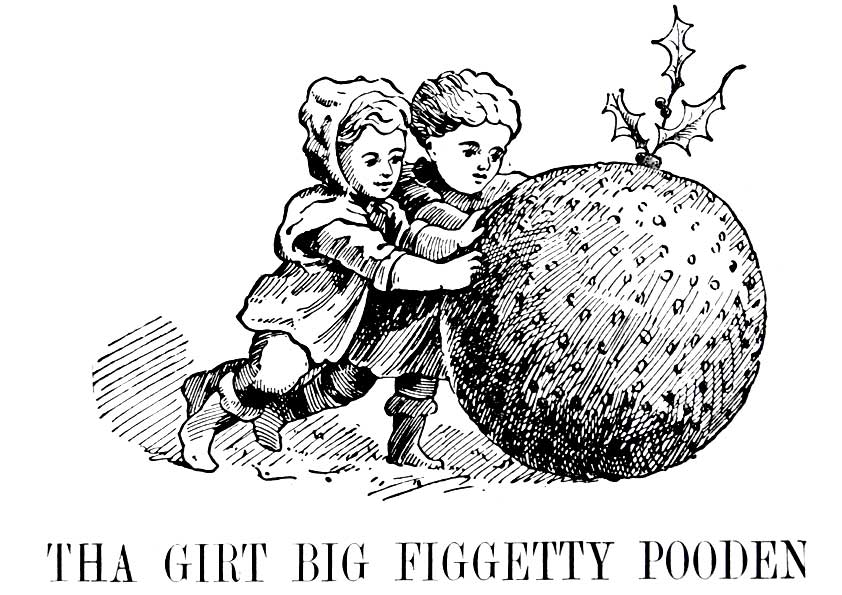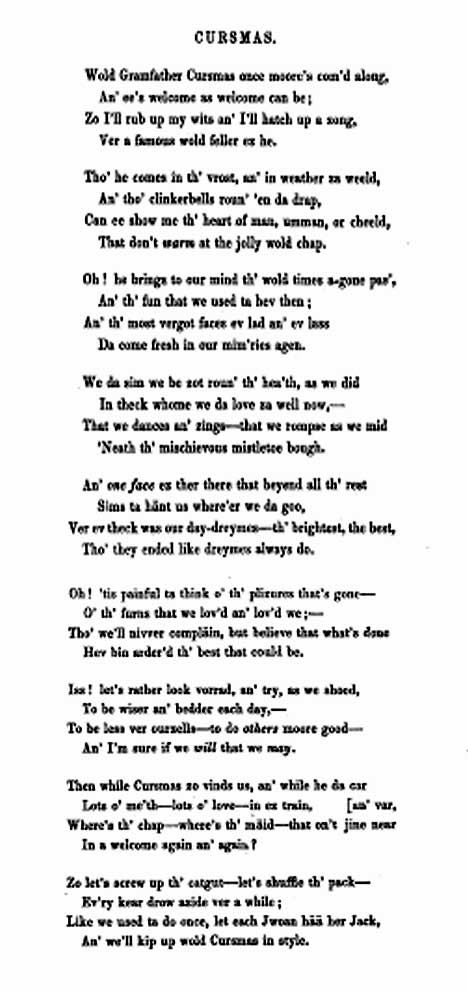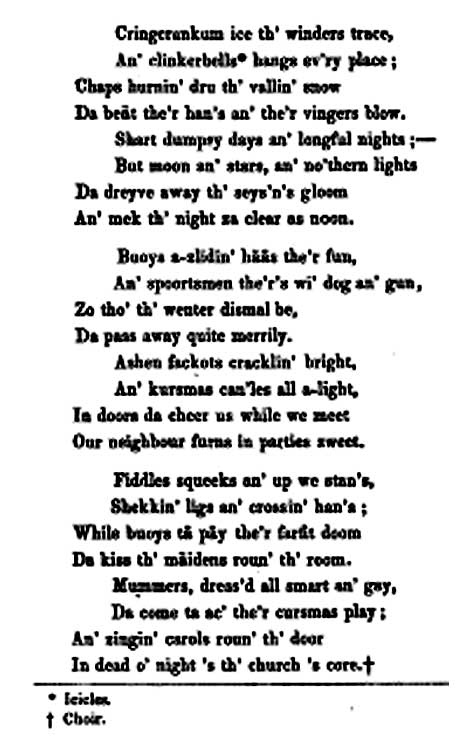Christmasing and Wassailing
Jim Potts
John Symonds Udal writes about the custom of Christmasing, St. Thomas's Day, 21st December, in Dorsetshire Folk-Lore (1922; also Toucan Press, 1970; p.49):
“Christmas being the principal season of the year for feasts and other festive rejoicings – when people were generally supposed to be more charitably disposed towards their fellow-beings than at any other time – many of the poorer class would seek by visiting in good time the houses of their richer neighbours to obtain the means of taking some share of these rejoicings themselves. This was generally called “Christmasing”.
It was also known as ‘going a gooding’.
He had sent an account of the custom to Notes and Queries in 1872:
“In recognition of Christmas greetings…(they)… would receive substantial pieces or ‘hunks’ of bread and cheese, bread and meat, or small sums of money…This, I should have stated, always took place on or about St. Thomas’s Day, the 21st of December.”
He cites John Brand (Fellow and Secretary of the Society of Antiquaries of London) “that it may have been only another name for the northern custom of going about and crying ‘Hagmena’.”
Hagmena seems to be another spelling of Hogmanay, but it may have been linked with the holy month, not just the New Year’s celebrations, as in Scotland, if we are inclined to accept one old derivation, that hagmena came from the Greek, ???? ???? (holy month); in some places the custom was associated with door-to-door carol singing, the exchange of Christmas and New Year’s greetings, in the days before Christmas, on Christmas Eve and Christmas Day. There are a number of other possible derivations.
Udal also quotes from William Barnes two famous Christmas dialect poems (p 100-101), Chris’mas Invitation and Keepen up o’Chris’mas – perennial favourites.
From Chris’mas Invitation
Come down to-morrow night; an, mind
Don’t leave thy fiddle-bag behind;
We’ll sheake a lag, an’ drink a cup
O’eale, to keep wold Chris’mas up….
An’ ev’ry woone shall tell his teale,
An’ ev’ry woone shall zing his zong,
An’ ev’ry woone wull drink his eale
To love an’ frien’ship all night long.
The point of this posting (discussed at a meeting with Marion Tait) is to suggest that teachers at Dorset schools might like to encourage pupils to try writing a short verse in the Dorset dialect, either in the form of a poem for a Christmas greetings card, or as a toast (perhaps after a Christmas meal), as a carol or other kind of song, or as an invitation to a Christmas party. Maybe the verse would also be suitable for a revival of the Christmas Eve Wassail tradition, a sort of door-to-door “Trick-or-Treat” or as an addition to the carol-singing custom.
“This seems to have been done in some places upon Christmas Eve; for in Herrick’s "Hesperides," p. 311, I find it among the Christmas Eve ceremonies. Sir Thomas Ackland, Bart. informed Mr. Brand at Werington, October 24th, 1790, that this was done in his neighbourhood on Christmas Eve. See also "Gent. Mag." 1791, p. 116. "Archæol," vol. xi. p. 420” (W. Carew Hazlitt, Faith and Folklore… Forming A New Edition of "The Popular Antiquities of Great Britain" By Brand and Ellis (full citation below).
Rather than quote those two wonderful William Barnes poems in full here, I would like to mention some dialect poems by R.R.C Gregory, from Poems in Dialect, The Somerset Folk Series, No. 5, 1922. Walter Raymond notes, in No. 1 of that series, that Mr. Gregory, who was born in Berkshire, moved to the West Country in 1881; he made Somerset his home for twenty years, working as a schoolmaster in North Cadbury and Castle Cary. He was very interested in folklore and folk life. He wrote some plays which were performed at North Cadbury village hall; his earliest dialect poetry was published in the Castle Cary Visitor.
From his book of dialect poetry, it would appear that he wrote a number of poems which he sent to his friends as Christmas or New Year greetings.
This is one called The Tooast:
Here’s to vriends, an here’s to voes,
Droo all the world, as round it goes,
Joy, an’ Peace, an’ Love, an’ Health,
An’ ef t’wull please ‘em, plenty o’ Wealth.
But of all good wishes in thease ’ere toast,
’Tis Joy an’ Love we d’wish ’em mooast.
Here are two verses from another poem he sent to friends, Christmas, 1899
Could I but zing, I’d ply thee wi’ a zong,
T’ood warm thy ’eart and zet thee all avire;
I’d zing a Christmas toone, zo loud an’ long,
T’ood sheame the boys an’ maidens in the quire;
Wi’ mistletoe, I’d deck thik wold brown hat,
An’ zing o’Love an’ Peace, and likes o’ that.
But I be wold, and croaky in the droat,
Though in my ’eart the Christmas music rings, -
Yet, I can squeeze thy hand, though poor my note,
An’ wish thee all the joy the zeason brings.
“Here’s luck to thee, an’ vriends, both far an’ near, -
“Here’s luck, an’ love, an’ best o’ Christmas Cheer.”
I may be something of a Dorset/Somerset county patriot, but I have also been reading some delightful Wiltshire and Devonshire dialect poems. and some traditional Yorkshire dialect poems, the Wiltshire poems written by Edward Slow (1841-1925), the Yorkshire poems compiled by F. W. Moorman for the Yorkshire Dialect Society (1916, 1917), which I include by way of contrast and for comparison.
From Yorkshire: I wish you a merry Kessenmas an' a happy New Year
I wish you a merry Kessenmas an' a happy New Year,
A pokeful o' money an' a cellar-full o' beer.
A good fat pig an' a new-cauven coo;
Good maisther an' misthress, hoo do you do?
A Christmas Wassail (from Yorkshire)
Here we coom a-wessellin
Among the leaves so green,
An' here we coom a-wanderin'
So fair as to be seen.
Chorus-
An' to your' wessel
An' to jolly wessel,
Love an' joy be to you
An' to your wessel-tree¦
We are not beggars' childeren
That begs from door to door,
But we are neighbours' childeren
That has been here before.
An' to your wessel, etc.
We have got a little purse
Made i' ratchin leather skin,
An' we want a little money
To line it well within.
An' to your wessel, etc.
Bring us out your table
An' spread it wi' a cloth;
Bring us out your mouldy cheese
Likewise your Christmas loaf.
An' to your wessel, etc.
God bless the master o' this house,
Likewise the mistress too;
An' all the little childeren
That round the table go.
An' to your wessel, etc.
Good master an' good' misteress,
While you're sittin' by the fire
Pray, think of us poor childeren
That's wanderin' i' the mire.
An' to your wessel, etc.
(Note -Ratchin = Urchin, hedgehog).
This certainly represents a very different attitude and way of perceiving Christmas from the verses that can be found in "Poor Robin", the almanac for 1695, which include the following:
"Now thrice welcome, Christmas,
Which brings us good cheer,
Minc’d pies and plumb-porridge,
Good ale and strong beer;
With pig, goose, and capon,
The best that may be,
So well doth the weather
And our stomachs agree.
Observe how the chimneys
Do smoak all about,
The cooks are providing
For dinner, no doubt;
But those on whose tables
No victuals appear,
O may they keep Lent
All the rest of the year!
Edward Slow, the Wiltshire dialect poet, has two wonderful poems to which I must refer, Gramfer's Crismis and A Wiltshire Bwoy’s Lines On a Girt Big Figgetty Pudden. I feel sure that admirers of Barnes' Christmas poems will also enjoy Edward Slow’s descriptions of the Wiltshire ways of keepen woold Crismis up!

“A oft I thinks apon tha time,
Wen Crismiss bells merry da chime,
Wat a girt pudden, nice an prime
Mother always mead vor we.
A used ta com in steamin hot,
Nearly as big’s a girt bee pot,
Wie vigs an currands sich a lot,
In mother’s Crismiss pudden!
(Excerpt; from A Series of Poems in the Wiltshire Dialect, 1881).

NB Note some variations in spelling and choice of words, from different editions
From Gramfer's Crismis:
Then Fiather Crismis mead a spache
A wishen ael good cheer,
Likewise a merry Crismis-tide,
An a happy, bright new year.
An atter that thay ate an drunk
As much as they wur willin,
Then out coms grammer as she gies
Ta every man a shillin.
(Excerpt; from The Fifth Series, Wiltshire Rhymes and Tales, 1894)
G. P. R. Pulman (George Philip Rigney Pulman) the Axminster poet who also wrote under the pen-name Piscator, published some of his East Devonshire dialect poems in the Sherborne Journal between 1840-1842, and published the first edition of his Rustic Sketches in 1842. In his introduction (1st May, 1842) he states that he writes in “a sort of medium brogue between the broad Somerset and Dorset, without much tinge of pure Devon”.
Here is his Christmas poem, "Cursmas":

Here are some wonderful verses from the middle of his poem "Winter":

Notes on the origins of Wassail
Source: Brand's Popular Antiquities Of Great Britain
W. Carew Hazlitt, Faith and Folklore: A Dictionary of National Beliefs, Superstitions and Popular Customs, Past and Current, With Their Classical and Foreign Analogues, Described and Illustrated. Forming A New Edition of "The Popular Antiquities of Great Britain" By Brand and Ellis, Largely Extended, Corrected, Brought Down To The Present Time, and Now First Alphabetically Arranged. In Two Volumes, London: Reeves and Turner, 1905. Vol. 2, pp. 619-20
“There was an ancient custom, which is yet retained in many places, on New Year’s Eve: young women went about with a wassail bowl of spiced ale, dressed up with garlands and ribbons, and with some sort of verses that were sung by them as they went from door to door. Wassail is derived from the Anglo-Saxon Væ Þæl, be in health. It were unnecessary to add, that they accepted little presents on the occasion from the houses at which they stopped to pay this annual congratulation.
Wassail originally signified a salutation, but afterwards grew to signify revelry, excess. It appears from Thomas de a Moore (Vita Edw. II.) and Havillan (in "Architren." lib. 2), that was-haile and drinc-heil were the usual ancient phrases for quaffing among the English…we calling it a health, as they did also in direct terms; which, with an idol called Heil, antiently worshipt at Cerne in Dorsetshire, by the English Saxons, in name expresses both the ceremony of drinking and the new years acclamation, whereto in some parts of this kingdom is joyned also solemnity of drinking out of a cup, ritually composed, deckt and filled with country liquor," &c.—Seldens’s Notes on Drayton’s Polyolb, song 9.


From Selden’s Notes – See mention of Cerne, Dorset and the ancient worship of Heil, 1613
W. Carew Hazlitt continues:
…From Wither’s Christmas Carol it seems that the girls went about in the streets with these bowls, and sang carols, no doubt, with the same view….The word wassail was in certain parts of the country corrupted into vessel, and it was usual to carry about the vessel-cup at Christmas, and sing carols, with a view to collect money. This was done in 1813, and perhaps later, at Holderness and in other parts of Yorkshire. The cup was sometimes accompanied by an image of Christ and roasted apples”.
In an 1849 edition of John Brand’s “Popular Antiquities of Great Britain”, revised and enlarged by Sir Henry Ellis, the vessel-cup was described as being carried about the villages during the week before Christmas, by a poor woman or girl carrying two dolls, “one to represent the Virgin Mary, and the other the child”; she would sing a Christmas song at each house, expecting to be given a halfpenny. It was considered bad luck for a whole year to send her away unrewarded (at least the first vessel-cup singer to knock at the door).
Richard Blakeborough, writing of the customs in the North Riding of Yorkshire (1898), says that “the ‘vessel-cups’ (i.e.wassail-cup) still come round, with their doll in a box, decked out as the Virgin Mary, lying in pink cotton-wool and evergreens”.
There’s not much point in trying to revive old customs like “wassailing” or “going a gooding”; we now prefer to go out carol singing, or to welcome carol singers at our doors.
It’s wonderful to be wished “A Happy Chris’mas/Crismiss/Cursmas/Kessenmas”, to be greeted in one of the many attractive regional or foreign accents, or traces of dialects, to be heard in most communities around Britain these days, whether from Yorkshire, Dorset, the Caribbean, from other parts of Europe, Asia, Africa or Australia. Whatever our backgrounds may be, we can still try to promote the seasonal messages of goodwill, peace and happiness.

Starts 00:00
William Barnes Harvest Celebration

17:00 till 19:00
The Year Clock

10:30 till 12:00
Annual Service of Remembrance of William Barnes

10:00 till 17:00
William Barnes at Stock Gaylard Oak Fair 2025

15:00 till 17:00
Celebrating William Barnes, Poet and Priest at Whitcombe Church

14:30 till 15:30
Keepen Up O' Chris'mas

